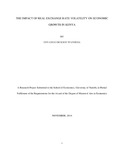| dc.description.abstract | Kenya has witnessed exchange rate volatility following financial liberalization in the late
1980s which led to increased foreign private capital flows. Fluctuations in international world
prices attributed to exchange rate volatility which hinders economic growth rate. These
fluctuations increase risk and uncertainty in international transactions and thus discourage
trade which consequently hampers economic growth. Changes have occurred in foreign
exchange market as exhibited by strong appreciation of Kenyan Shilling between 2004 and
2007 of value 30.0% which is a major deviation from its past levels. Therefore, the
relationship between exchange rate volatility and economic growth might have changed
owing to these changes. This brings about the need of another study to inform the Kenyan
monetary policy makers on the impact of exchange rate volatility to allow them make
informed decisions concerning monetary. Therefore the main objective of the study was to
identify the effect of exchange rate volatility on economic growth in Kenya. Using secondary
time series data for the period 1980 to 2012, the study employed OLS estimation method to
identify the effect of exchange rate volatility on GDP growth rate. Augmented Dickey-Fuller
test (ADF) was used in unit root testing to determine whether the series was stationary or nonstationary
and establish their order of integration. The study found that exchange rate
volatility positively impacts on GDP growth but is not significant in affecting GDP growth
rate. The result differed with Musyoki at el (2012) who found a negative relationship between
exchange rate volatility and economic growth in Kenya. The study recommended that policy
makers should find equilibrium on the devaluation and appreciation of exchange rate since
devaluation of domestic currency provides important opportunity for economic growth, it
promotes exports capacity and reduces volume of imports. | en_US |

